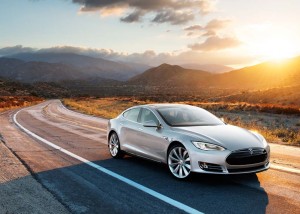“The rich are different from you and me,” or so is the slightly misquoted comment from F. Scott Fitzgerald, but the fact is that they can afford from pretty exclusive vehicles – such as the Tesla Model S, the battery-electric vehicle that tops out at more than $100,000.
And according to the latest sales data, it’s become one of the favorites among the affluent motoring sect. Data tracking service Edmunds reports that the Model S is now the most-registered new car in eight of the nation’s 25 wealthiest neighborhoods tracked by zip code.
But the bulk of those communities are located in California, as anyone who has visited the sprawling Los Angeles metroplex lately can’t help but notice. It appears that the Tesla battery car has become the latest status symbol among the region’s trend-setters – among the rich, a more fitting green fashion statement than the more plebian Toyota Prius that gained notoriety a few years back when actor Leonardo DiCaprio arrived in one for the Oscars ceremony.
“Influential people set trends while the mainstream aspires to follow,” writes Edmunds analyst Jessica Caldwell. “With the proclivity of tech geek being chic, the Silicon Valley area will set trends faster than traditional high-income markets like New York.”
In Atherton, Calif., zip code 94027, where the average home goes for $6.7 million, the Tesla Model S now commands a 15% share of new vehicle registrations. In nearby Los Altos Hills, it’s 11%.
That’s not to say the Model S has no appeal outside the Left Coast. It is gaining ground in the Northeast and, to a lesser degree, in other parts of the country – especially as Tesla expands its dealer network and sets up more of its high-speed superchargers, with the goal of putting at least one of these fast-charge facilities within 70 to 100 miles of every possible American buyers.
In fact, demand is growing outside North America, notably in Germany, Norway and even China, where a news report this week notes that the first reported customer paid $410,000 for one of the sleek battery sedans. That’s a significant mark-up for a vehicle that starts at $70,000 in the States, where even a fully loaded Tesla Model S tops out around $104,000.
That, of course, is on top of the work that may be needed to set up the home charging system that can handle the vehicle’s big battery. When charging, the longest-range, 85 kilowatt-hour pack can require nearly as much energy as the typical home uses in more plebian communities. The wiring and hardware can add thousands to a Model S price tag.
Nonetheless, demand has been strong enough that the Model S has been selling at nearly the same rate as the Nissan Leaf at barely a third the price tag.
Part of the secret appears to be that demand for the Model S has been buoyed as much by image as by any desire to reduce fuel costs – a factor that surveys show motivates buyers of more mainstream electric vehicles.
(New battery deal could boost Tesla production. For more, Click Here.)
With gas prices tumbling at the pump, lower-priced models, such as the Chevrolet Volt have been tumbling in recent months, the Chevy plug-in hybrid off nearly a third in October compared to year-earlier numbers.
But while wealthy buyers may be propping up demand for the Tesla, that doesn’t mean the Silicon Valley start-up doesn’t have its problems. Two battery fires and a series of doubting reviews by investment analysts has hit the maker hard. After experiencing a five-fold run-up in its stock price since the beginning of the year, Tesla shares have tumbled sharply since the beginning of October, losing about $4.1 billion in market capitalization.
(Click Here to read about Tesla sales rising in spite of fires.)
But that seems to have fazed the company only slightly. It just inked a revised contract with battery supplier Panasonic that should permit it to substantially boost production. Meanwhile, Daimler AG has indicated its desire to expand earlier ties to Tesla as the German parent of Mercedes-Benz boosts its own presence in the battery-car market.
So, the rich may soon have still more ways to put Tesla vehicles – or Tesla-derived powertrains – in their driveway.


Just as I formerly predicted… The pretend your green car image. At least there will be a lot of low mileage Tesla cars for museum pieces in a couple years.
Where are the actual production numbers? 4000 the first quarter, should be 4000 the next 2 quarters.
Where are the actual numbers?
By the way, a 2.5″ diameter cylinder such as an exhaust pipe could easily punch a 3″ hole in 1/4″ “aluminum armor plate”. Especially since there is NO such thing as “aluminum armor plate”. Just ask the designers of the Bradley fighting vehicle or the sailors that died during the Falklands on those “aluminum armored” ships.